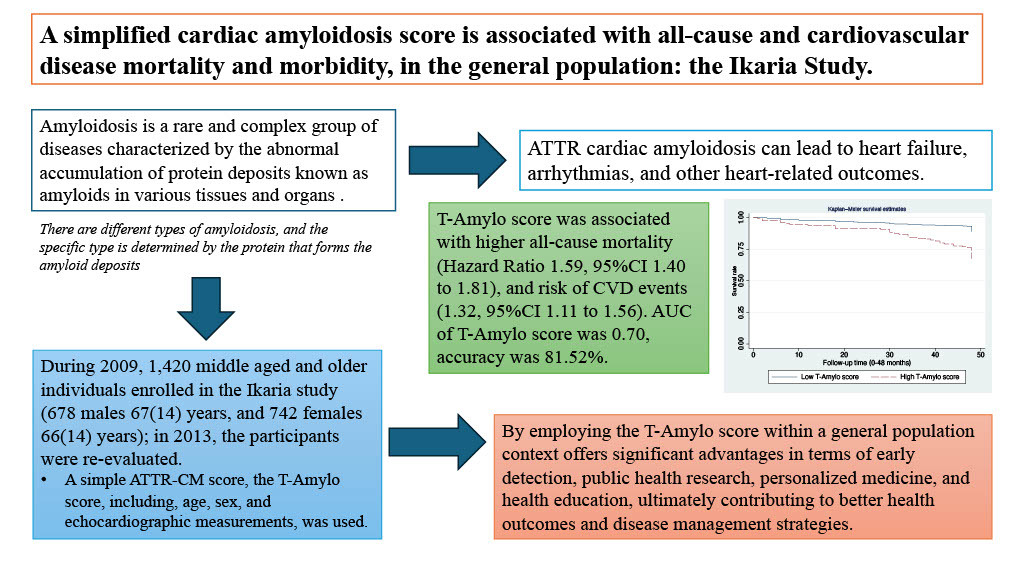Current issue
Archive
Manuscripts accepted
About the Journal
Editorial office
Editorial board
Section Editors
Abstracting and indexing
Subscription
Contact
Ethical standards and procedures
Most read articles
Instructions for authors
Article Processing Charge (APC)
Regulations of paying article processing charge (APC)
Editor's Choice
CARDIOLOGY / RESEARCH PAPER
A simplified cardiac amyloidosis score is associated with all-cause and cardiovascular disease mortality and morbidity, in the general population: the Ikaria Study.
1
First Cardiology Clinic, Hippokration Hospital, School of Medicine, University of Athens, Athens, Greece, Greece
2
Harokopio University, Greece
Submission date: 2024-05-15
Final revision date: 2024-08-01
Acceptance date: 2024-08-05
Online publication date: 2024-09-07
Corresponding author
Demosthenes Panagiotakos
Harokopio University, 70 Eleftheriou Venizelou, 17671, Kalithea, Athens, Greece
Harokopio University, 70 Eleftheriou Venizelou, 17671, Kalithea, Athens, Greece
KEYWORDS
TOPICS
ABSTRACT
Introduction:
Transthyretin amyloid cardiomyopathy (ATTR-CM) is an under-appreciated disease. The aim of this study was to evaluate the T-Amylo score, i.e., ATTR-CM related, in relation to all-cause and cardiovascular disease (CVD) morbidity and mortality, in the general population.
Material and methods:
The T-Amylo score (range 0-11) is based on clinical and echocardiographic features (age and gender, IVSd thickness >=16 mm, low QRS interval voltage, and carpal tunnel syndrome) that have been previously introduced in clinical practice.
Results:
During 2009, 1,420 middle aged and older inhabitants agreed to enroll into the Ikaria study (678 males aged 67(14) years, and 742 females aged 66(14) years); in 2013, the participants were re-evaluated. Survival analysis revealed that the T-Amylo prediction score was associated with all-cause mortality (Hazard Ratio 1.59, 95%CI 1.40 to 1.81), and the risk of combined CVD events (1.32, 95%CI 1.11 to 1.56), after various adjustments made. ROC analysis revealed that the AUC of T-Amylo score was 0.70, the accuracy was 81.52%, and the net-reclassification indices suggested better reclassification performance than its components. Stratifying by age group, the score predicts all-cause and CVD mortality and morbidity only among >65 years old individuals.
Conclusions:
The prognostic value for CVDs of the T-Amylo score observed here seems promising for its use in the general population, too.
Transthyretin amyloid cardiomyopathy (ATTR-CM) is an under-appreciated disease. The aim of this study was to evaluate the T-Amylo score, i.e., ATTR-CM related, in relation to all-cause and cardiovascular disease (CVD) morbidity and mortality, in the general population.
Material and methods:
The T-Amylo score (range 0-11) is based on clinical and echocardiographic features (age and gender, IVSd thickness >=16 mm, low QRS interval voltage, and carpal tunnel syndrome) that have been previously introduced in clinical practice.
Results:
During 2009, 1,420 middle aged and older inhabitants agreed to enroll into the Ikaria study (678 males aged 67(14) years, and 742 females aged 66(14) years); in 2013, the participants were re-evaluated. Survival analysis revealed that the T-Amylo prediction score was associated with all-cause mortality (Hazard Ratio 1.59, 95%CI 1.40 to 1.81), and the risk of combined CVD events (1.32, 95%CI 1.11 to 1.56), after various adjustments made. ROC analysis revealed that the AUC of T-Amylo score was 0.70, the accuracy was 81.52%, and the net-reclassification indices suggested better reclassification performance than its components. Stratifying by age group, the score predicts all-cause and CVD mortality and morbidity only among >65 years old individuals.
Conclusions:
The prognostic value for CVDs of the T-Amylo score observed here seems promising for its use in the general population, too.
Share
RELATED ARTICLE
We process personal data collected when visiting the website. The function of obtaining information about users and their behavior is carried out by voluntarily entered information in forms and saving cookies in end devices. Data, including cookies, are used to provide services, improve the user experience and to analyze the traffic in accordance with the Privacy policy. Data are also collected and processed by Google Analytics tool (more).
You can change cookies settings in your browser. Restricted use of cookies in the browser configuration may affect some functionalities of the website.
You can change cookies settings in your browser. Restricted use of cookies in the browser configuration may affect some functionalities of the website.



